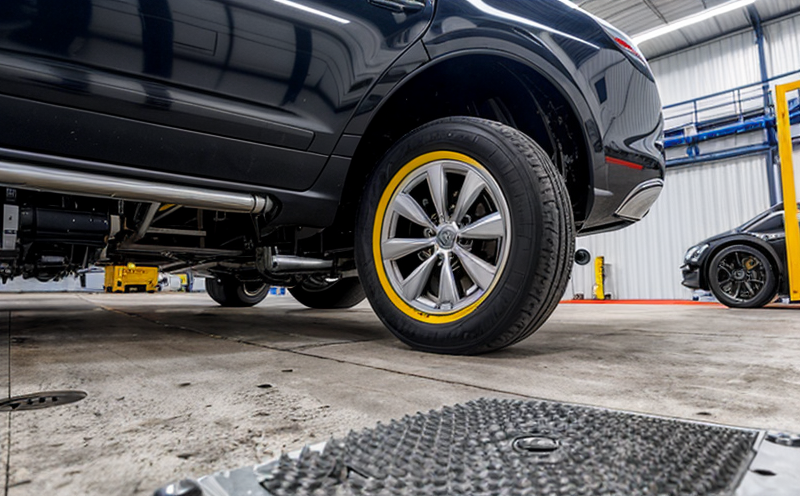ASTM B117 Corrosion Testing of Aerospace and Automotive AM Parts
The aerospace and automotive sectors demand high-performance materials that can withstand extreme conditions. Additive Manufacturing (AM) offers a solution by enabling the creation of complex geometries and structures with precise control over material properties. However, to ensure these parts meet safety and performance standards, rigorous testing is essential.
ASTM B117 corrosion testing is one such critical test used in this context. This standard specifies a salt spray (fluorides) exposure test for determining the resistance of nonferrous metals and their alloys to atmospheric corrosion. The test simulates the corrosive effects of salt-laden air, which can be especially challenging for parts manufactured using AM techniques.
The process involves exposing the samples to a controlled environment where they are sprayed with a neutral salt solution (sodium chloride) in an atmosphere maintained at 35°C ±2°C. The test duration varies depending on the desired result, typically ranging from 168 hours up to several weeks or months. During this time, the integrity of the parts is monitored for signs of corrosion such as rusting, pitting, or other degradation.
For aerospace and automotive components, this testing ensures that additive manufactured parts can withstand the harsh environmental conditions they will encounter in real-world applications. The test results are crucial for quality managers to ensure compliance with international standards like ISO 9001:2015 and AS9100D.
Specimen preparation is critical for accurate testing outcomes. AM parts undergo thorough cleaning before exposure, ensuring no contamination or external factors influence the test results. The specimens are mounted in a manner that allows uniform salt spray coverage to simulate real-world conditions accurately.
The instrumentation used includes specialized chambers capable of maintaining temperature and humidity levels precisely. These chambers provide a controlled environment where the salt spray can be applied consistently, replicating environmental stressors as closely as possible. Once testing is complete, detailed reports are generated, highlighting any signs of corrosion observed during the test period.
ASTM B117 is widely recognized in both aerospace and automotive industries for its reliability in assessing corrosion resistance. It ensures that additive manufactured parts can endure rigorous operational conditions without failing prematurely. This testing not only enhances product reliability but also contributes significantly to reducing maintenance costs and improving overall safety standards.
Why It Matters
The importance of ASTM B117 corrosion testing in the aerospace and automotive sectors cannot be overstated. In both industries, precision engineering is paramount for ensuring the safety and longevity of parts used in critical applications. AM technology allows for the creation of lightweight yet strong components that can withstand harsh environmental conditions.
- Ensures compliance with international standards such as AS9100D and ISO 9001:2015.
- Reduces the risk of premature failure due to corrosion, enhancing overall product reliability.
- Aids in meeting regulatory requirements for parts used in aerospace and automotive applications.
The test results are vital for quality managers as they provide critical insights into the performance capabilities of AM parts. By identifying potential issues early on, these tests help prevent costly rework or failures in end products. This proactive approach ensures that parts manufactured using additive manufacturing meet stringent industry standards and can be trusted to perform reliably under various conditions.
In summary, ASTM B117 corrosion testing is a cornerstone of quality assurance in the aerospace and automotive sectors. It plays an essential role in ensuring that AM parts are robust enough to withstand real-world operational environments, thereby enhancing overall product safety and performance.
International Acceptance and Recognition
- The ASTM B117 corrosion test is internationally recognized for its reliability in assessing the resistance of nonferrous metals and alloys to atmospheric corrosion. It has been widely adopted by aerospace and automotive manufacturers around the world.
- This standard ensures consistent testing methodologies across different regions, allowing for accurate comparisons between results obtained from various laboratories.
The global acceptance of ASTM B117 is evident in its use across numerous countries that have national standards aligned with this test method. For instance, many European Union (EU) member states follow this procedure as part of their regulatory frameworks. Similarly, the United States Federal Aviation Administration (FAA) and National Highway Traffic Safety Administration (NHTSA) reference ASTM B117 in their guidelines for aviation and automotive components.
The widespread adoption of ASTM B117 underscores its relevance not only within individual industries but also on a broader scale. By adhering to this standardized approach, manufacturers can ensure that their products meet the highest quality standards, fostering trust among customers and regulatory bodies alike.
Competitive Advantage and Market Impact
- Aerospace and automotive companies that successfully pass ASTM B117 corrosion testing gain a significant competitive edge. This certification demonstrates their commitment to producing reliable parts that can withstand the harshest environmental conditions.
- Purchasers of these parts are more likely to trust products that have undergone rigorous testing, leading to increased market share for compliant manufacturers.
The ability to pass ASTM B117 corrosion tests enhances brand reputation and customer confidence. It signals to stakeholders that the manufacturer prioritizes product quality and durability, which is particularly important in industries where failures can lead to severe consequences.
In terms of market impact, companies that excel in this area are better positioned to attract contracts from major OEMs (Original Equipment Manufacturers). These manufacturers value suppliers who demonstrate a strong commitment to quality control processes like ASTM B117. As a result, successful completion of the test can open doors to lucrative opportunities within these key markets.
Furthermore, compliance with such rigorous testing protocols reflects well on a company's overall reputation in the industry. It positions them as leaders in innovation and reliability, attracting not only larger customers but also smaller clients who seek dependable suppliers for their projects.





